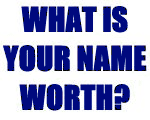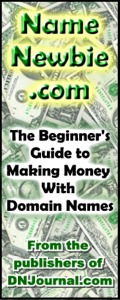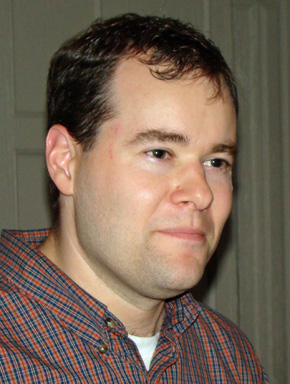|
To find out more about what went into the
making of The Domain Game, I got together with
Kesmodel for the interview below. In a story you haven't heard
before, Kesmodel tells us how the process unfolded, how he managed
to get the book into print after the original publisher pulled out,
what he would do differently if he had a second chance and what the
domain industry could do to clean up its image. In short, here is
the inside story of how Kesmodel produced his inside story of the
domain industry:
DN Journal:
First let me congratulate you on the excellent job you did in
researching and writing The Domain Game. I donít
think anyone could read it without appreciating the hard work and
attention to detail that went into the book. The end result is an
essential reference for anyone who wants to learn about the domain
business, its history and the key players who have shaped this
unique industry. In your reporting career you have covered a
lot of compelling business stories. What was it about the domain
industry that captivated your attention to the degree that you were
willing to commit the time and effort necessary to write a book
about it?
David Kesmodel:
Thank you, Ron. I was drawn to the people in the industryóthe bold
thinkers and risk takers who spend most of their waking hours
investing in domains. Some of them are pretty colorful characters. I
was also curious about how secretive much of the industry is. I
thought I could write a compelling book that showed how leading
domain investors became successful, while also shedding light on how
this little-understood and fast-changing business works. Long before
I wrote about domains, I was intrigued, like many people, by the
news stories about names that changed hands for millions of dollars.
But I wanted to dive beneath the surface and know a lot more about
the individuals and companies that made up this market. I was also
attracted to the challenge of weaving together the seemingly loosely
connected events involving domains from the past 15 years or
soómany of which hadnít been written about in great detailóand
showing how they fit together and resulted in the dynamic market we
have today.
|
DN Journal:
You wound up getting some great inside stories from many
domain pioneers. The section on Scott Day, who gave you
a great account of how he found success in the business, was
worth the price of the book. However, as you were researching
the book I know that some people were reluctant to talk to
you. Once the book came out some of those who had declined to
share their stories said they wished they had participated.
Given your previous track record of covering the industry in a
fair and accurate manner, why do you think it was so hard to
get those people to co-operate?
David Kesmodel: I suspect
there were a lot of factors at play. Some people probably were
afraid that I might write a book that largely focused on the
negative aspects of the industry, and whether or not they were
involved in the negative side, they didnít want to be
included in such a book. I also think many domain investors
are private people, and they just didnít feel comfortable
with the idea of spending hours with an author talking about
themselves. Itís often a much bigger deal to do an interview
for a book than for a newspaper article.
|
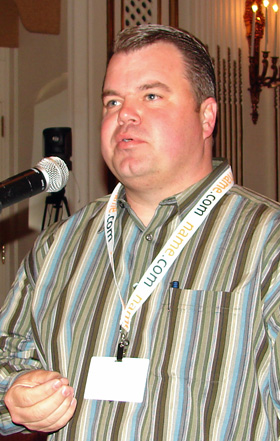
Scott
Day - one of the domain pioneers
featured in The Domain Game |
Another issue is
that a lot of domain investors donít like to talk about their
investment strategies and specific names they ownóand how they
acquired themófor competitive reasons. So I think some investors
just didnít see much to gain from talking to me. They might have
felt that it wasnít worth the headache of figuring out what they
could tell me and what they should leave out.
Finally, I have a
little doubt that some domain investors didnít want to talk
because they have been involved in the shadier aspects of the
industry and wanted to limit their exposure in the book.
DN Journal:
Now that the book is out, what kind of reaction have you gotten from
the many people that you wrote about in The Domain Game?
David Kesmodel:
There are a number of people I havenít heard from, but the
reactions Iíve received have been very positive. I think domain
investors, by and large, feel that I did my homework and was fair in
my approach. One of the things Iím proud of is that some veteran
investors told me they first learned about a number of events from
reading my book, and that they were surprised at some of the
discoveries.
DN Journal:
Writing a book is a major undertaking that requires you to commit a
significant piece of your life to getting it done. How long did the
project take from start to finish and what were some of the biggest
challenges you had to overcome and sacrifices you had to make along
the way to get The Domain Game into print?
|
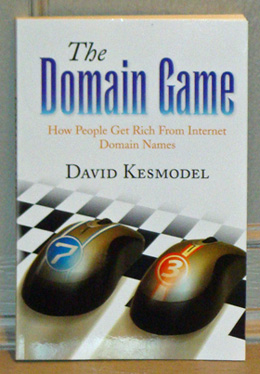
|
David Kesmodel:
I signed a book contract in September 2006 and turned in the
manuscript in March 2007, so the heavy lifting was done in
about six months. The publisher, Thomas Nelson, told my
agent it wanted the book done in six months, which isnít a
lot of time for an author, so I felt I had to quit my job and
work my tail off to write a decent book. I would have liked to
have had a full year.
The biggest
challenge was figuring out how to manage my time. I had to do
a lot of research and a lot of interviews in a brief period. A
big hurdle was to quickly identify which investors Iíd
highlight in the bookóand then persuade them to participate.
Some friends whoíve written books advised me to start
writing the manuscript early, even while my research was
incomplete, and I was very glad I heeded their advice. I was
still doing interviews up to the last week. The sacrifices
were many. In those six months, I worked about 18 hours a
day every day of the week and barely did anything fun, as
my wife will attest. The main sacrifices were made by my wife
and oldest daughter. They didnít see me much, and my wife
didnít get much help around the house.
|
DN Journal:
You wound up publishing The Domain Game yourself after
your original publisher backed out of the project. I have heard
people question whether there is enough mainstream interest in
domains to make a book profitable - was that the reason behind
the publisherís decision? Why did you feel the level of interest
was high enough to make it work and what can you tell people about
the pros and cons of going the self-publication route, which is one
Iím sure others are considering for their own projects.
David Kesmodel:
Yes. Thomas Nelson received my manuscript in March 2007 and had an
editor start working on it. But two months later, the new head of
business books sent my agent an email and said he was pleased with
the manuscript but was canceling the project because he didn't think
it had enough sales and marketing potential. It was very
disappointing. Obviously, the previous head of business titles had
approved the project. I thought there would be enough interest to
make the book profitable because millions of people use the Web, and
many have become very interested in domain names. Plus, I felt the
stories of people becoming hugely successful financially after
starting with little would be inspiring to a wide range of people in
business.
I decided to
self-publish using a service called Xlibris, and am happy to
say that, when I receive my next royalty check in a couple of
months, I will have made this a profitable venture, although it's a
very modest profit at this point. The upside of self-publishing is
that you have control over what your book looks like and when it
goes on the market. And you can go out and do deals with marketing
partners, etc. The downside, and it is a big one, is you have to do
the marketing yourself. And it's very hard to get mainstream press
reviews for a self-published title. It's also very difficult to get
your books into brick-and-mortar stores. I've decided to focus my
attention on Web distribution and marketing, and Xlibris has
alliances with top names like Amazon and Barnes &
Noble. In addition, Eurocom Books is publishing and
marketing the book outside the U.S.
|
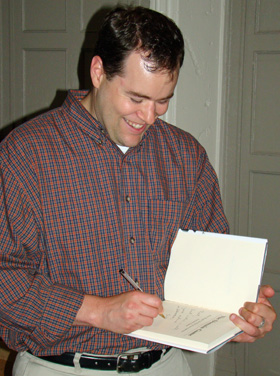
Kesmodel
at a book signing party at the GeoDomain Expo in Chicago
- July 2008 |
DN Journal:
Having gone through the process, knowing what you know now,
would you do it again? If yes, are there any things you would
do differently?
David Kesmodel:
I would still do it, but first I would find a publisher that
shows greater enthusiasm for the project. Even when I landed
my contract, and while I was racing to meet the deadline, I
had a weird feeling about Thomas Nelson. I never felt I was
much of a priority and had a nagging sense that something was
going to go wrong. In that sense, it wasn't shocking that they
pulled the plug. Regardless of this setback, I remember
thinking one late, solitary night while working on the
manuscript that no matter what happened to the book--whether
it made it onto bookshelves and whether it made money--I would
always relish the time I spent interviewing people like Frank
Schilling and Scott Day and typing up their tales.
Among other things I would do differently
is spend more time traveling to meet domain investors face to
face. Limited time and funds caused me to keep travel at
a |
| minimum. But I think the expense
would have been worth it to secure more interviews, which
would have made the book stronger. And I might have been able
to persuade more of the reluctant domainers to play ball if I
just showed up in person.
|
DN Journal:
There is a certain addictive quality about domain names. Once
exposed to them it is hard to put them out of your mind. Having
researched the industry so thoroughly did you get bitten by the
domain bug in any way with respect to registering or buying domains
of your own?
David Kesmodel:
I did a little bit, and I registered a few names. Some of those are
to promote the book. But I'm so busy with my job and family life
that I haven't felt that I've had enough time to invest in domains
in the deliberate, measured way I'd want to do it. I'm also not much
of a risk-taker. I tend to prefer observing and writing about
exciting business trends, rather than participating in them.
DN Journal:
Given the asset value of the domain business as a whole Iíve
always been struck by how few people understand it and have made a
living out of doing it. In talking to so many different people
involved in the industry did you see what you felt were any common
characteristics of those who have done well in the business?
|
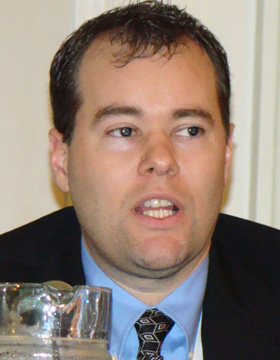
Kesmodel
speaking at the
GeoDomain Expo in Chicago - July 2008 |
David Kesmodel:
Absolutely. Above all, I found people who are very curious,
are eager to find ways to make a buck and work for themselves
and who arenít so impressed with corporate America. These
are entrepreneurial types who are skeptical of taking
conventional paths to success and really value their
independence. They tend to have a high tolerance for risk. And
another key aspect that goes to your question is they are
willing to dive into some nitty-gritty technical issues and
learn them and figure out how the knowledge can benefit
them.
Domains are simple in some ways, but a willingness to learn
a little bit about computer programming and how the backbone
of the Web works really pays off. And I think these technical
issues are what deter a lot of people from delving into
domains. In fact, I remember being on the Web in the mid-1990s
myself, fresh out of college, and just assuming that setting
up my own Web site, getting a domain, etc., would be too
complicated. I recall |
| playing around with a GeoCities
page. If Iíd been more curious and willing to spend the time
to understand the Web, perhaps I would have stumbled into
domains.
|
DN Journal:
You obviously now have a lot more knowledge about this business than
the average person. You also have the perspective of someone who
writes about other business categories. Many generic domain
portfolio owners lament the ďimageĒ problem the domain industry
has and are looking for ways to clean up that image and be accepted
as a mainstream business. What do you think domainers need to focus
on doing to get the same kind of press coverage and acceptance that
other business sectors enjoy?
David Kesmodel:
Industry leaders should put together press kits that include
educational Q&A-type documents explaining to journalists how the
industry works. These could include primers to help journalists
understand the different types of domain investing and help them
recognize the difference between, for example, someone who focuses
on generics and someone who deals in trademark-related terms.
Industry leaders should do outreach to journalists in which they
meet with them without pitching them on stories. Journalists welcome
meetings where they don't feel pressure to write a story but can
learn about an industry and then later decide what to write about
and when to do so.
It could also help
the industry if more leading domain investors became open to the
idea of letting reporters into their lives and showing them how they
live and what they do. I think it would also help if the venture
capitalists and big private-equity backers in this business were
more willing to meet with reporters and share their views on the
industry. In short, more transparency and greater access for
reporters would really help.
|
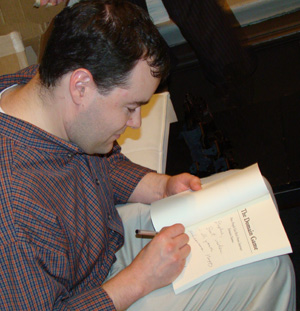
|
DN Journal:
I understand you are off covering another beat now Ė tell us
about that and also whether or not you still follow what is
happening in the domain world. AlsoÖand be honest nowÖis
the industry you are covering now nearly as interesting as
domains?
David Kesmodel:
I'm covering the alcohol industry and the grocery industry for
the Journal and really enjoying it. The biggest issue I've
written about lately is the takeover of Anheuser-Busch
by Belgium's InBev. I do keep up with key events in the
domain world, although I don't have the time to read as many
stories and blog entries as I'd like. The booze and food
industries have their interesting components. The nice thing
is that they involve a lot of money and many consumers are
interested in the |
| topics. But unlike the domain
business, these are very mature, slow-growing industries so
they lack some of the excitement inherent to emerging markets
like domains. And I haven't yet encountered as many zany
characters. So the domain industry is more interesting in some
ways, and less interesting in others. Itís a toss-up for me.
As long as I can find good stories--and all industries have
them--Iím happy. |
*****
The Domain Game can
be purchased at a discounted price through Amazon.com.
Those who will be at the T.R.A.F.F.I.C.
New York conference on Wednesday Sept. 24 can
pick up a copy from Kesmodel himself as he will be at the show
signing books from 10:30am-4:30pm that day.
In our opinion, anyone who is serious about understanding and
profiting from the business of domains should own a copy.
Return
to Domain Name Journal Home Page |
